I been struggling for some time with a XmlComparsion functionality. I have to compare two Xml for differences and then display them in a TreeView way.
I've done some research and found out Google Diff Match Patch library that looks exactly what I need for my comparison part.
https://github.com/google/diff-match-patch
I've implemented it as following
public List<Diff> DiffLineMode(string text1, string text2)
{
var a = base.diff_linesToChars(text1, text2);
var lineText1 = a[0];
var lineText2 = a[1];
var lineArray = (IList<string>)a[2];
var diffs = base.diff_main(lineText1.ToString(), lineText2.ToString(), false);
base.diff_charsToLines(diffs, lineArray);
return diffs;
}
Now my big challenge which I would need some help with is getting this difference into a treeview like object.
I've done a tree view class in which I parse both my Xml files used in comparison
public class TreeViewModel
{
public long ID { get; set; }
public string NodeName { get; set; }
public string AbsolutPath { get; set; }
public string Value { get; set; }
public string Xml { get; set; }
public int Operation { get; set; } = 2;
public List<TreeViewModel> Children { get; set; }
public Dictionary<string, string> Attributes { get; set; }
}
And now what I would like to do is make sure the Operation from TreeView matches the Operation result from DIffMatchPatch, but my problem is that DiffMatchPatch compares Xml as string and does not consider at all Xml as a node tree. As a result for 2 simple Xml book files.
<?xml version="1.0"?>
<catalog>
<book id="bk101">
<author>Gambardella, Matthew</author>
<title>XML Developer's Guide</title>
<genre>Computer</genre>
<price>44.95</price>
<publish_date>2000-10-01</publish_date>
<description>An in-depth look at creating applications
with XML.</description>
</book>
<book id="bk112">
<author>Ralls, Kim</author>
<title>Midnight Rain Update but should not reflect</title>
<genre>Fantasy</genre>
<price>5.95</price>
<publish_date>2000-12-16</publish_date>
<description>A former architect battles corporate zombies,
an evil sorceress, and her own childhood to become queen
of the world.</description>
</book>
<book id="bk999">
<author>O'Brien, Tim</author>
<title>Microsoft .NET: The Programming Bible</title>
<genre>Computer</genre>
<price>36.95</price>
<publish_date>2000-12-09</publish_date>
<description>Microsoft's .NET initiative is explored in
detail in this deep programmer's reference.</description>
</book>
<book id="bk998">
<author>Chris Tucker</author>
<title>This Is my Churck</title>
<genre>Music</genre>
<price>49.99</price>
<publish_date>2021-11-03</publish_date>
<description>This is a custom description from Sebi Ciuca</description>
<coauthor>Sebi</coauthor>
</book>
<book id="bk103">
<author>Corets, Eva</author>
<title>Maeve Ascendant</title>
<genre>Fantasy</genre>
<price>5.95</price>
<publish_date>2000-11-17</publish_date>
<description>After the collapse of a nanotechnology
society in England, the young survivors lay the
foundation for a new society.</description>
</book>
</catalog>
and
<?xml version="1.0"?>
<catalog>
<book id="bk101">
<author>Gambardella, Matthew</author>
<title>XML Developer's Guide</title>
<genre>Computer</genre>
<price>44.95</price>
<publish_date>2000-10-01</publish_date>
<description>An in-depth look at creating applications
with XML.</description>
</book>
<book id="bk102">
<author>Ralls, Kim</author>
<title>Midnight Rain</title>
<genre>Fantasy</genre>
<price>5.95</price>
<publish_date>2000-12-16</publish_date>
<description>A former architect battles corporate zombies,
an evil sorceress, and her own childhood to become queen
of the world.</description>
</book>
<book id="bk103">
<author>Corets, Eva</author>
<title>Maeve Ascendant</title>
<genre>Fantasy</genre>
<price>5.95</price>
<publish_date>2000-11-17</publish_date>
<description>After the collapse of a nanotechnology
society in England, the young survivors lay the
foundation for a new society.</description>
</book>
<book id="bk997">
<author>Corets, Eva</author>
<title>Maeve Ascendant Part II</title>
<genre>Fantasy</genre>
<price>15.95</price>
<publish_date>2022-01-17</publish_date>
<description>After one collapse of a nanotechnology
society in England, the young survivors lay the
foundation for a new society.</description>
</book>
</catalog>
it will output this
"difference": [
{
"operation": 2,
"text": "<catalog>\r\n <book id=\"bk101\">\r\n <author>Gambardella, Matthew</author>\r\n <title>XML Developer's Guide</title>\r\n <genre>Computer</genre>\r\n <price>44.95</price>\r\n <publish_date>2000-10-01</publish_date>\r\n <description>An in-depth look at creating applications \r\n with XML.</description>\r\n </book>\r\n"
},
{
"operation": 0,
"text": " <book id=\"bk112\">"
},
{
"operation": 1,
"text": " <book id=\"bk102\">"
},
{
"operation": 2,
"text": " <author>Ralls, Kim</author>\r\n <genre>Fantasy</genre>\r\n <price>5.95</price>\r\n <publish_date>2000-12-16</publish_date>\r\n <description>A former architect battles corporate zombies, \r\n an evil sorceress, and her own childhood to become queen \r\n of the world.</description>\r\n </book>\r\n"
},
{
"operation": 0,
"text": " <book id=\"bk999\"> <author>O'Brien, Tim</author> <title>Microsoft .NET: The Programming Bible</title> <genre>Computer</genre> <price>36.95</price> <publish_date>2000-12-09</publish_date> <description>Microsoft's .NET initiative is explored in detail in this deep programmer's reference.</description> </book> <book id=\"bk998\"> <author>Chris Tucker</author> <title>This Is my Churck</title> <genre>Music</genre> <price>49.99</price> <publish_date>2021-11-03</publish_date> <description>This is a custom description from Sebi Ciuca</description> <coauthor>Sebi</coauthor> </book>"
},
{
"operation": 2,
"text": " <book id=\"bk103\">\r\n <author>Corets, Eva</author>\r\n <title>Maeve Ascendant</title>\r\n <genre>Fantasy</genre>\r\n <price>5.95</price>\r\n <publish_date>2000-11-17</publish_date>\r\n <description>After the collapse of a nanotechnology \r\n"
},
{
"operation": 1,
"text": " society in England, the young survivors lay the foundation for a new society.</description> </book> <book id=\"bk997\"> <author>Corets, Eva</author> <title>Maeve Ascendant Part II</title> <genre>Fantasy</genre> <price>15.95</price> <publish_date>2022-01-17</publish_date> <description>After one collapse of a nanotechnology "
},
{
"operation": 2,
"text": " society in England, the young survivors lay the \r\n foundation for a new society.</description>\r\n </book>\r\n</catalog>"
}
]
which looks something like this in a more "readable" view
Now as you can see if you nave 2 or more nodes difference, they are "put" together inside as a "hole difference" this makes it very tricky for me to parse it into a treeview like object.
Here you can also see for book997 which is a hole new book but with the same description as book103, it will consider the "added" text beging from description of book 103 and ending before the description of book997. This in a way I would like to translte into Node that both nodes have changes, but I don't know what I can use to match a specific TreeView Node with a part or hole of a difference.
Hope I made myself clear. I start to feel I started very wrong with GoogleDiffMatchPatch for what I need, but at this point it would be even harder for me to create a custom xml comparer based on nodes.
EDIT : Added also the Parsing from XML To TreeView
public TreeViewModel ToTreeView(XDocument xmlDocument)
{
var rootNode = xmlDocument.Root;
return ParseNode(rootNode, 1);
}
private TreeViewModel ParseNode(XElement node, int parentId)
{
if (node.HasElements)
{
var index = 0;
var children = new List<TreeViewModel>();
bool hasChild = false;
foreach (var element in node.Elements())
{
children.Add(ParseNode(element, parentId * 10 + index, panoramaId));
index++;
}
var treeNode = new TreeViewModel
{
Children = children,
Value = hasChild ? string.Empty : node.Value,
AbsolutPath = node.GetAbsoluteXPath(),
ID = parentId,
Xml = node.ToString(),
NodeName = node.Name.ToString(),
Attributes = node.GetAttributes()
};
}
else
{
var treeNode = new TreeViewModel
{
ID = parentId,
Value = node.Value,
AbsolutPath = node.GetAbsoluteXPath(),
NodeName = node.Name.ToString(),
Attributes = node.GetAttributes(),
Xml = node.ToString(),
};
}
}
Added git repository : https://github.com/SebiCiuca/DiffMatchPatchToNodeView
